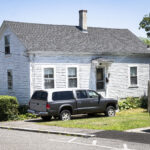There is a psychological theory about names that posits that what we are named can influence what we do with our lives. The theory, called nominative determinism, was popularized in a New Scientist column called “Feedback” in 1994.
Examples of nominative determinism include Usain Bolt being a sprinter or former Lord Chief Justice of England and Wales Igor Judge.
So if you have the last name Brookhouse, you ought to have a notable house, right?
It turns out that this theory might just hold some water.
The Brookhouse family had been living in Salem for generations before purchasing land in Marblehead, which would eventually become the property at 201 Humphrey St.
According to a document in the Massachusetts Cultural Resource Information System, the family was “the family was established in Salem by Robert Brookhouse, born ca. 1720 in England, a master mariner and privateer captain aboard Lively during the Revolution.”
Following him came a long line of Robert Brookhouses. His son Robert Brookhouse II died at sea in 1779, but his son Robert Brookhouse III was born the same year, after his father met his watery demise.
Robert Brookhouse III and Robert Brookhouse IV, MACRIS claims, are the two who built the family fortune. They accumulated wealth through merchantry, including the North Atlantic slave trade.
MACRIS cites “Networks and Trans-Cultural Exchange, Slave Trading in the South Atlantic, 1590-1867” by David Richardson and Filipa Ribeiro Da Silva, which highlights the Brookhouses’ impact on the slave trade.
“One of the largest American trading houses in the trade with Angola and Kongo – Robert Brookhouse, of Salem, Massachusetts – played an important role in furnishing slave trading entrepots with commodities to trade in slaves. As well as the slave trade, the Brookhouse trading house also actively engaged in licit commerce in Angola,” the book reads.
MACRIS states that the Brookhouse family acquired land in Marblehead in 1827 through 1834 and the marriage of Robert Brookhouse IV in 1845. A Salem marriage record from 1845 makes note of a Robert Brookhouse Jr., who married Anna Sutton.
In the 1870 census, Robert Brookhouse and Anna Sutton are listed as living in Marblehead with their five children. At the time, the property was worth $36,000 and Robert Brookhouse had personal wealth worth $60,000.
The family owned the property until 1920, at which time Robert Brookhouse IV’s heirs, including yet another Robert Brookhouse, sold the property.
The Marblehead house in which Robert Brookhouse IV lived is a testament to how deep some local families’ histories go back and how strong those lineages are. At the same time, this house is also a testament to how much wealth could be produced by participation in the North Atlantic slave trade, even if indirectly.


